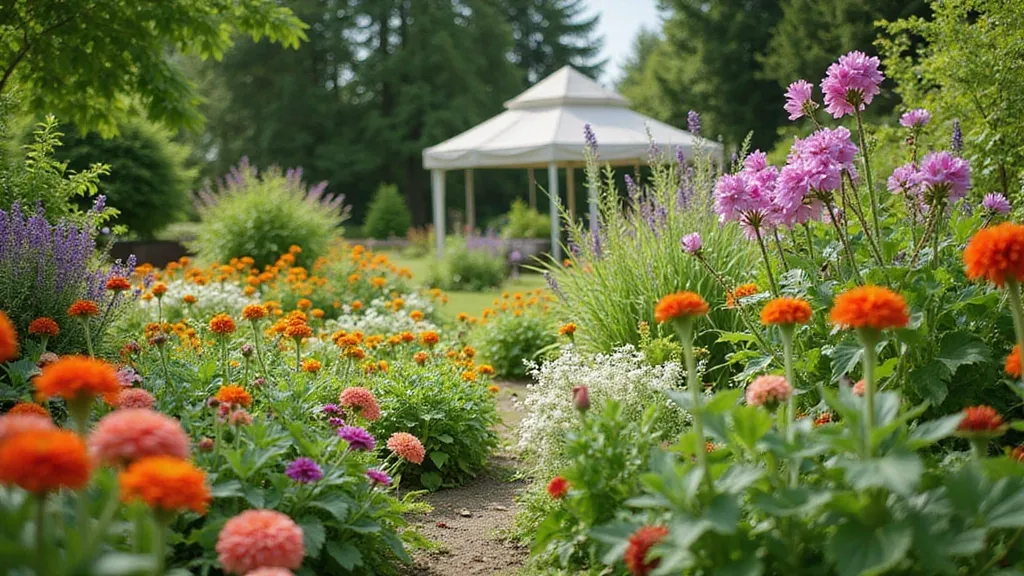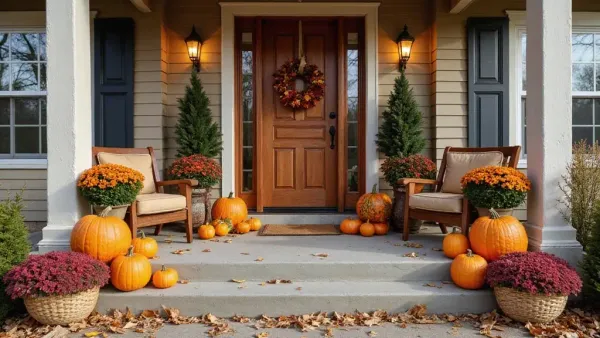15 Sustainable Gardening Tips for a Lush Summer Garden (Even Beginners Can Do #8!)

Summer is the perfect time to cultivate a vibrant garden that not only thrives but also respects our planet. With sustainable gardening practices, you can nurture your green thumb and create a paradise of summer plants while contributing to organic growth and environmental health. Whether you're a gardening novice or looking to enhance your existing skills, these 15 tips will inspire you to delve into the world of sustainable gardening. Get ready to turn your backyard into a blooming oasis that brings joy throughout the summer!
Let’s dig in and discover how simple changes can lead to a lush and sustainable garden, perfect for making your summer unforgettable. Embrace eco-friendly practices that yield beautiful results, and let’s get those hands dirty!
1. Choose Native Plants

Starting with native plants is a brilliant first step for sustainable gardening. Native plants are adapted to your local climate and soil, which means they thrive with minimal intervention. By planting these beauties, you help local wildlife, including bees and butterflies, while reducing the need for chemical fertilizers or excess water.
Consider visiting a local nursery that specializes in native species. This ensures that you’re planting varieties that will flourish in your area. Plus, many native plants are perennials, meaning you’ll enjoy their beauty for years to come!
Some popular native summer plants include coneflowers, black-eyed Susans, and butterfly weed. These can add a splash of color while supporting biodiversity.
Here are a few tips to make the most out of your native plants:
- Research what grows best in your specific area.
- Group plants with similar water and sunlight needs together to make watering easier.
- Mulch around your plants to retain moisture and suppress weeds.
Embracing native plants is not just about aesthetics; it's about creating a mini-ecosystem right in your backyard that flourishes naturally.
2. Composting for Organic Growth

Composting is a game-changer for sustainable gardening! By recycling kitchen scraps and yard waste, you create nutrient-rich compost that can supercharge your garden’s soil. This organic material enhances soil structure, improves moisture retention, and provides essential nutrients, leading to healthier plants.
Start by collecting vegetable peels, coffee grounds, eggshells, and dry leaves in a compost bin. Layering greens (nitrogen-rich materials) and browns (carbon-rich materials) creates a balanced compost mix. Remember to turn your compost regularly to aerate it, speeding up the decomposition process.
Here’s a quick guide to successful composting:
- Make sure your compost bin has good drainage.
- Avoid adding meat or dairy, as they attract pests.
- Keep the compost moist but not soaked.
After a few months, you’ll have black gold ready to nourish your garden. Not only do you reduce waste, but you also promote organic growth without relying on chemical fertilizers!
3. Water Wisely

Watering is crucial for any garden, especially during the hot summer months. However, it’s essential to do so wisely to conserve precious resources. Instead of frequent light watering, aim for deeper, less frequent watering sessions. This encourages your plants to develop robust root systems, making them more resilient to drought.
Consider implementing a drip irrigation system or soaker hoses to provide consistent moisture directly to the soil. If you can, collect rainwater in barrels to use for your garden. It’s a sustainable choice that reduces your water bill and promotes eco-friendly practices.
Also, watering early in the morning or late in the evening minimizes evaporation. Here are some additional tips:
- Add mulch around plants to retain moisture and reduce weeds.
- Check soil moisture levels before watering – a simple finger test can do wonders!
- Group plants with similar water needs together to streamline efforts.
With thoughtful watering, your garden will thrive sustainably, and you’ll help conserve water at the same time.
4. Embrace Companion Planting

Companion planting is like creating a dream team for your garden. Certain plants thrive together, boosting growth and deterring pests naturally. For instance, planting basil near tomatoes can enhance their flavor and help repel harmful insects. This age-old technique not only maximizes space but also promotes organic growth without pesticides.
When choosing companion plants, consider the following pairings:
- Marigolds with almost any vegetable to repel nematodes and aphids.
- Garlic planted near carrots to ward off carrot flies.
- Beans with corn, as the beans fix nitrogen and provide support for the corn.
Keep in mind that some plants can negatively affect each other, so research your combinations beforehand. Here’s how to set up your companion planting scheme:
- Plan your garden layout with beneficial pairings in mind.
- Rotate crops each year to prevent soil depletion and pest build-up.
- Observe how plants interact and adjust as needed.
Building a harmonious garden with companion planting can lead to bountiful harvests and healthier plants!
5. Use Natural Pest Control

Every gardener faces pest challenges, but that doesn’t mean you have to reach for chemical pesticides. Embracing natural pest control methods can keep your plants healthy while protecting the environment. Introducing beneficial insects, such as ladybugs and lacewings, can help manage harmful pests like aphids.
You can also create homemade sprays using natural ingredients. A simple soap spray—made with a few drops of dish soap mixed with water—can help deter soft-bodied pests without harming beneficial ones.
Here are some additional tips for natural pest control:
- Encourage birds by adding bird feeders or baths—these feathered friends love munching on insects!
- Plant herbs like mint or rosemary that repel certain pests naturally.
- Use floating row covers to protect young plants from pest attacks while they establish.
By adopting these practices, you’ll not only protect your garden but also contribute to a healthier ecosystem.
6. Practice Crop Rotation

Crop rotation is a sustainable gardening practice that prevents soil depletion and reduces pest and disease issues. By rotating crops, you ensure that specific nutrients aren’t repeatedly drawn from the soil, allowing it to recover naturally. This technique also disrupts pest cycles, making your garden less susceptible to infestations.
Consider grouping your plants into families and mapping out a rotation plan. For instance, after harvesting leafy greens, plant legumes the following season to restore nitrogen levels.
Here are a few key points to remember about crop rotation:
- Start with a rotation schedule suited to your garden layout.
- Keep records of what you plant where, to track your rotations easily.
- Include cover crops in your rotation to improve soil health further.
With crop rotation, your garden will remain productive, vibrant, and sustainable for many seasons to come.
7. Grow Your Herbs

Herbs are an essential part of summer gardening, and growing your own can add fresh flavors to your meals while promoting sustainable practices. Herbs like basil, parsley, and thyme are easy to grow, even in small spaces like pots or window boxes. They thrive in warm weather and can be harvested throughout the season.
Instead of buying pre-packaged herbs, which often come with excess plastic waste, start your own herb garden. Having fresh herbs at your fingertips not only enhances your cooking but also reduces your carbon footprint.
When growing herbs, consider these tips:
- Choose a sunny spot in your garden or on your balcony.
- Harvest regularly to encourage bushy growth.
- Experiment with companion planting by grouping different herbs together.
Creating an herb garden is an instant way to incorporate sustainable gardening into your home, plus it makes for a lovely aromatic haven!
8. Start a Pollinator Garden

Creating a pollinator garden is a fantastic way to support local ecosystems. Pollinators like bees, butterflies, and hummingbirds play a vital role in the food chain, and by planting flowers that attract them, you enhance the biodiversity of your area. Bright blooms like sunflowers, lavender, and bee balm are not only beautiful but vital for these creatures’ survival.
To start a pollinator garden, select a variety of plants that bloom at different times throughout the summer, ensuring a consistent food supply. Avoid using pesticides or herbicides to keep the blossoms safe for pollinators.
Here are some easy steps to create your pollinator paradise:
- Choose a sunny area with shelter from harsh winds.
- Incorporate native flowering plants for better attraction.
- Provide water sources, like shallow dishes with pebbles, for resting insects.
By establishing a pollinator garden, you’ll create a lush environment that thrives with life, making your summer garden even more vibrant and meaningful!
9. Implement Vertical Gardening

Limited space doesn’t mean you can’t have an abundant garden. Vertical gardening is an innovative way to maximize your space while keeping things visually appealing. By using trellises, wall planters, or hanging pots, you can grow everything from tomatoes to herbs without needing a lot of ground area.
This method not only saves space but also improves air circulation and sunlight exposure for your plants. Vertical gardens can be an attractive garden feature, transforming plain walls into lush living art.
Here are some tips for successful vertical gardening:
- Choose lightweight containers to avoid overwhelming the structure.
- Opt for climbing plants, such as beans or cucumbers, for instant vertical growth.
- Use drip irrigation systems to maintain efficiency and reduce waste.
Vertical gardening adds a unique touch to your home while contributing to sustainable gardening practices. Plus, the harvest is just as rewarding!
10. Reduce Lawn Areas

Traditional lawns require a lot of water, fertilizers, and maintenance. By reducing lawn areas and replacing them with native plants, gardens, or ground cover, you can create a more sustainable landscape. Not only do you save resources, but you also provide habitats for wildlife and enhance the beauty of your yard.
Consider converting parts of your lawn into wildflower meadows or edible landscapes. These areas can be low-maintenance and provide stunning seasonal displays.
Here are some practical ideas for reducing lawn areas:
- Designate specific zones for activities and fill in the rest with diverse planting.
- Use mulch or stones to create pathways and borders, minimizing grassy areas.
- Incorporate a mix of perennials and ornamental grasses for year-round beauty.
Reducing your lawn not only conserves water but also allows you to explore more creative and sustainable gardening practices.
11. Make Your Own Natural Fertilizers

Harnessing the power of natural fertilizers is one of the best ways to promote sustainable gardening. You don’t need to spend a fortune on store-bought options when you can make your own fertilizers using kitchen scraps and natural ingredients.
Banana peels, coffee grounds, and eggshells are all excellent sources of nutrients. For example, banana peels are rich in potassium, which is beneficial for flowering plants. Simply chop them up and bury them in the soil around your plants.
Here are a few ways to create your own natural fertilizers:
- Compost kitchen scraps for a nutrient-rich soil amendment.
- Create a liquid fertilizer by steeping comfrey leaves in water for a few weeks.
- Use diluted urine (yes, really!) as a nitrogen source for plants, avoiding direct contact with foliage.
By making your own fertilizers, you can enhance soil health and minimize waste, all while nurturing your summer garden sustainably.
12. Consider Edible Landscaping

Why limit your garden to just ornamental plants when you can have beauty and bounty? Edible landscaping involves incorporating food-producing plants into your landscape design, allowing you to enjoy fresh produce while beautifying your outdoor space.
Imagine a front yard bursting with colorful fruits, vegetables, and herbs instead of a traditional lawn. You can mix in flowering plants that attract pollinators while also providing food for your family.
Here’s how to get started with edible landscaping:
- Choose aesthetically pleasing varieties like purple basil, red kale, or cherry tomatoes.
- Combine edible plants with flowers to create visual interest and attract wildlife.
- Plan your design to ensure plants have enough space and sunlight.
Embracing edible landscaping is not just sustainable; it’s a fantastic way to promote healthy eating and enhance your culinary adventures right at home.
13. Use Organic Mulch

Mulching is an essential practice in sustainable gardening, and organic mulch is the way to go! Organic mulch, made from natural materials like wood chips, straw, or grass clippings, helps retain soil moisture, suppress weeds, and improve soil health as it breaks down over time. Plus, it gives your garden a tidy appearance.
When applying mulch, aim for a thickness of about 2-4 inches around your plants, avoiding direct contact with plant stems. This allows your plants to breathe while conserving moisture.
Consider these tips for using organic mulch effectively:
- Apply mulch at the beginning of the growing season for maximum benefits.
- Replenish mulch as it decomposes to maintain its effectiveness.
- Choose local mulch sources to reduce your carbon footprint.
Organic mulching not only keeps your garden looking great but also promotes a healthy environment for your plants to flourish.
14. Create a Habitat for Wildlife

Creating a haven for wildlife goes hand-in-hand with sustainable gardening. By incorporating elements such as birdhouses, bee hotels, and water features, you can attract various wildlife to your garden. This not only enhances the biodiversity of your space but also provides natural pest control and pollination services.
Native plants are excellent companions in this endeavor, as they provide food and shelter for local wildlife. Additionally, consider placing a small pond or birdbath in your garden to support drinking and bathing.
Here are some fantastic ways to create a wildlife-friendly habitat:
- Add a mix of plants that bloom at different times to provide food throughout the seasons.
- Leave some areas of your garden a bit wild for shelter.
- Avoid using chemical pesticides that could harm your visiting wildlife.
By creating a habitat for wildlife, you not only contribute to the ecosystem but also experience the joy of observing nature right in your backyard.
15. Keep Learning and Experimenting

Sustainable gardening is a journey that requires ongoing learning and experimentation. Each season brings new challenges and opportunities to discover what works best for your unique garden. Don’t be afraid to try new plants, techniques, or practices!
Join local gardening clubs or online communities to share experiences and gather tips from others. Attend workshops or read up on sustainable gardening literature to expand your knowledge.
Here are a few ways to keep your gardening spirit alive:
- Maintain a garden journal to record what you planted, the results, and changes for next year.
- Experiment with different sustainable practices and find what suits your gardening style.
- Share your successes and challenges with others to inspire and learn together.
By keeping an open mind and a willingness to learn, your sustainable garden will not only flourish but also continue to evolve into a thriving space for years to come.
Conclusion

Embarking on the journey of sustainable gardening opens up a world of possibilities for creating a lush summer garden. These 15 tips provide the perfect foundation to cultivate not just plants but also a deep connection with nature. Each practice contributes to a healthier environment, ensuring that your garden thrives sustainably for seasons to come.
So grab your gardening gloves, get your hands dirty, and embrace these eco-friendly techniques that make nurturing your garden both fulfilling and environmentally friendly!




